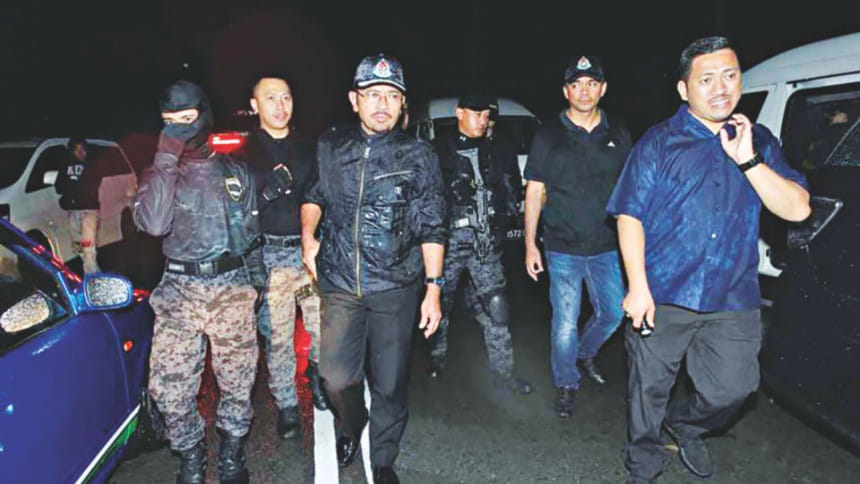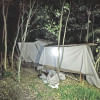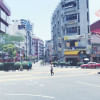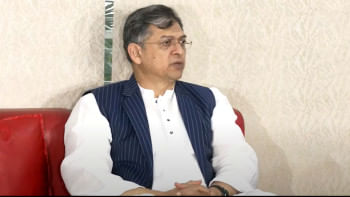Where is justice?

Hasan had applied for a work permit nearly six months before the Malaysian authorities' rehiring programme for undocumented foreign workers ended on June 30. He had all the documents to prove that, but those meant nothing to the immigration police.
On September 3, the police detained him and dozens of others from Bukit Bintang area of Kuala Lumpur, forced them to sit in handcuffs for hours and then took them to an immigration camp.
Hailing from Munshiganj, Hasan (not his real name) languished at the crowded camp at Bukit Jalil for nine long days. He finally managed to get out after his uncle, who has been living in the Malaysian capital for almost a decade, allegedly bribed some police officials 6,000 Ringgit (around Tk 1,20,000).
The 26-year-old Bangladeshi said all the detainees were unclothed and frisked inside the camp. “There were all kinds of workers -- those with and without valid documents. Many of them were made to do squat holding their ears …”
“I had no idea why I was detained and put into the camp this way,” he told The Daily Star on September 16, adding, “I lost my shoes and 350 Ringgit there.”
“I came to Malaysia seven years ago and became undocumented as my employer did not renew my visa. I had even applied to the Malaysian Immigration Department … You tell me what was my fault?” asked Hasan, who works at a shop in Bukit Bintang.
“Where is justice? We don't seem to have any dignity here as Bangladeshis,” he added.
Like Hasan, many other Bangladeshis are enduring such ordeals as Malaysia has been continuing a crackdown on irregular migrants since the rehiring programme ended on June 30. They are in trouble despite applying for work permits during the programme that had begun in February, 2016.
Between July 1 and last week, 10,495 workers from Bangladesh, Nepal, Indonesia, the Philippines, India and Pakistan have been held, Immigration Department Director-General Mustafar Ali said.
He said the crackdown would continue, Malaysian state news agency Bernama reported on September 14.
The exact number of the detained Bangladeshis could not be confirmed. However, Mustafar on September 4 said over 30,000 foreign workers have been detained since January and around 6,000 of them are Bangladeshis.
Currently, around 10 lakh Bangladeshis are staying in the Southeast Asian country. Of them, around half are reportedly undocumented migrants.
Most of them applied for the regularisation of work status and spent from 6,000 to 10,000 Ringgit for the procedures. However, nearly 80 percent of them are yet to get the permits and living in uncertainty and fear of detention, according the Bangladeshis.
Several rights groups have condemned the crackdown, saying the migrants became undocumented mostly because of the exploitation at the hands of their employers and labour brokers.
They said the detention of those having documents of application for work permits was a violation of the immigration act.
Naimul Haque, a Bangladeshi who lives in Kota Raya, a popular destination for migrants in Kuala Lumpur, said he faced sheer humiliation after he was picked up and put in another immigration camp for 17 days from July 1. He said it happened although he had applied for work permit and even paid all necessary fees.
Naimul was kept handcuffed with another worker for two days and made to sit on the floor. He was given no food on the first day.
“Police took four of us to a room, unclothed us to check … they also made us to do squats holding our ears 50 times.
“What was our crime?” he asked.
According to an Amnesty International report, immigration camps in the country are extremely overcrowded and fall far short of minimum international standards for places of detention.
“Detainees in immigration centres lack bedding, regular access to clean water, medication and sufficient food. They spend most of their time in their cells with no opportunities for exercise, organised worship or other activities. Diseases spread quickly, and fights are common,” it said.
Naimul said there were about 4,000 workers from Bangladesh, Indonesia, Nepal and Myanmar inside the camp in Semenyih, Putrajaya. Most of the detainees were Bangladeshis.
Among all the detained migrants in Malaysia, those having documents proving they applied for work permits were sent to immigration camps while the others to jail.
'SITUATION WORSE IN JAIL'
Several Bangladeshi migrants said the situation in jails were worse than that in the camps. They fear things may take a turn for the worse as the authorities continue arresting irregular workers.
One of them, Shahidul Islam, 33, said though he had all the documents of his application, he was kept in jail for five months in 2016.
“I was taken to the court five times. I had no lawyer… After five months, I was released as my documents were valid.
“So, why was I kept in the jail for those five months? Who would compensate it?” he posed the questions while talking to this correspondent at a labour camp in Cyberjaya in Selangar State on September 13.
He said some 100 to 150 prisoners were kept in a jail room which could hardly accommodate 25. “During those days in jail, I used to contemplate returning home and never come back [to Malaysia]. I used to cry every night.”
“I still feel bad for myself when I recall those days,” said Shahidul, who is from Bogura.
Adrian Pereira, executive director of North South Initiative, a rights body in Kuala Lumpur, said arbitrary arrest of migrants by police was nothing new.
“Many migrants have shared with us their stories but they are afraid of making formal complaints as they don't have confidence in the witness protection system and even the civil society can't guarantee their safety,” he said.
He said with technology, the verification of a migrant's status could be done on the spot. So detaining those having documents was a “shameless abuse of power by the authorities and a waste of government resources.”
Migrants should find a safe way to report to the authorities for redress and to end the cycle of corruption and rights violation, Adrian said.
Talking to The Daily Star, many Bangladeshi migrants demanded the Bangladesh government take a strong stance against arbitrary arrest and mistreatment by the Malaysian police.
“It's a matter of disgrace the way we, the Bangladeshis, are treated in the immigration camps and jails,” one of them said, wishing not to be named.
Contacted, Charles Santiago, an MP from Klang in Malaysia and known for his stance against abuses of migrants, told The Daily Star that he was aware of the complaints against the immigration police of arbitrary arrest and taking bribes.
“I will raise this issue in parliament,” he said on September 14.

 For all latest news, follow The Daily Star's Google News channel.
For all latest news, follow The Daily Star's Google News channel. 





Comments